Key takeaways:
- Programming bootcamps focus on hands-on learning, collaboration, and real-world problem-solving, fostering both coding skills and teamwork.
- Mac software offers a user-friendly interface and robust security, enhancing productivity and creativity through applications like Final Cut Pro and Keynote.
- Key programming languages for Mac development include Swift for its clean syntax and Objective-C for its integration with Apple’s frameworks, while Python offers versatility for automation.
- Essential tools for Mac development include Xcode for app creation, Homebrew for software management, and Git for version control, enhancing productivity and security.
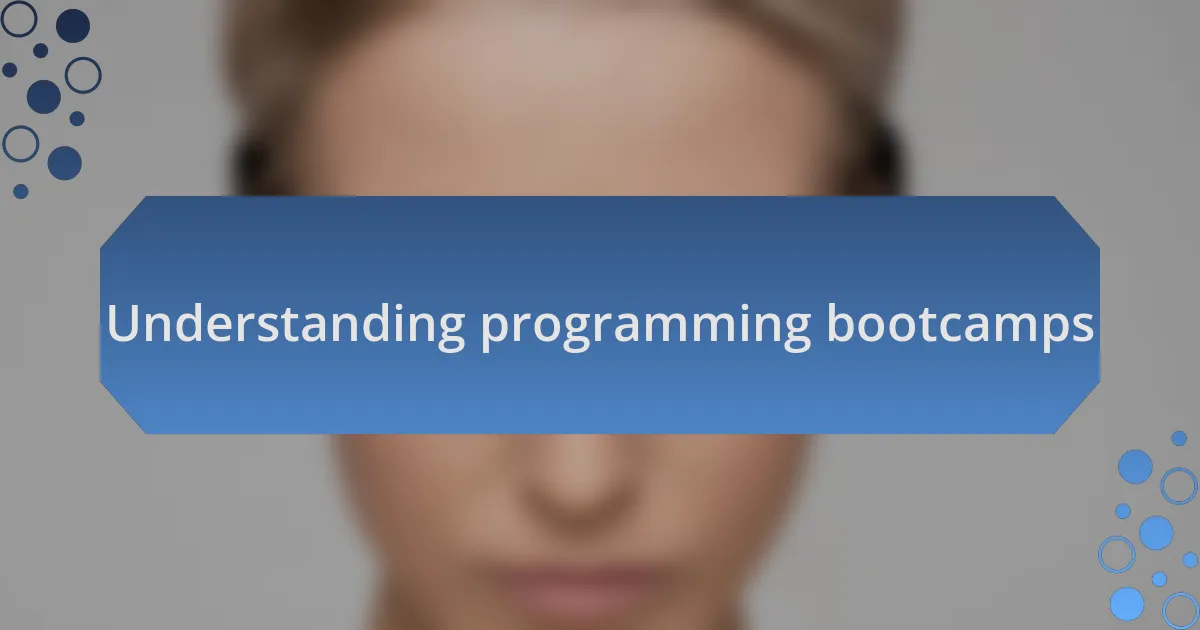
Understanding programming bootcamps
Programming bootcamps are intensive training programs designed to teach coding skills in a short period, often ranging from a few weeks to several months. I remember walking into my first bootcamp, feeling a mix of excitement and apprehension. Would I really be able to pick up all this information in such a brief time?
These bootcamps can vary widely in focus, from front-end development to data science. I once attended a bootcamp that focused on web development, and the hands-on projects were a game-changer for me. Each assignment pushed me out of my comfort zone, making me question my abilities but also igniting a passion I hadn’t fully recognized before.
Beyond just coding, these programs emphasize collaboration and real-world problem-solving. Do you think it’s enough to know how to write code? I learned that teamwork and communication are just as crucial. Having to work alongside others in group projects taught me more about patience and adaptability than any textbook ever could.
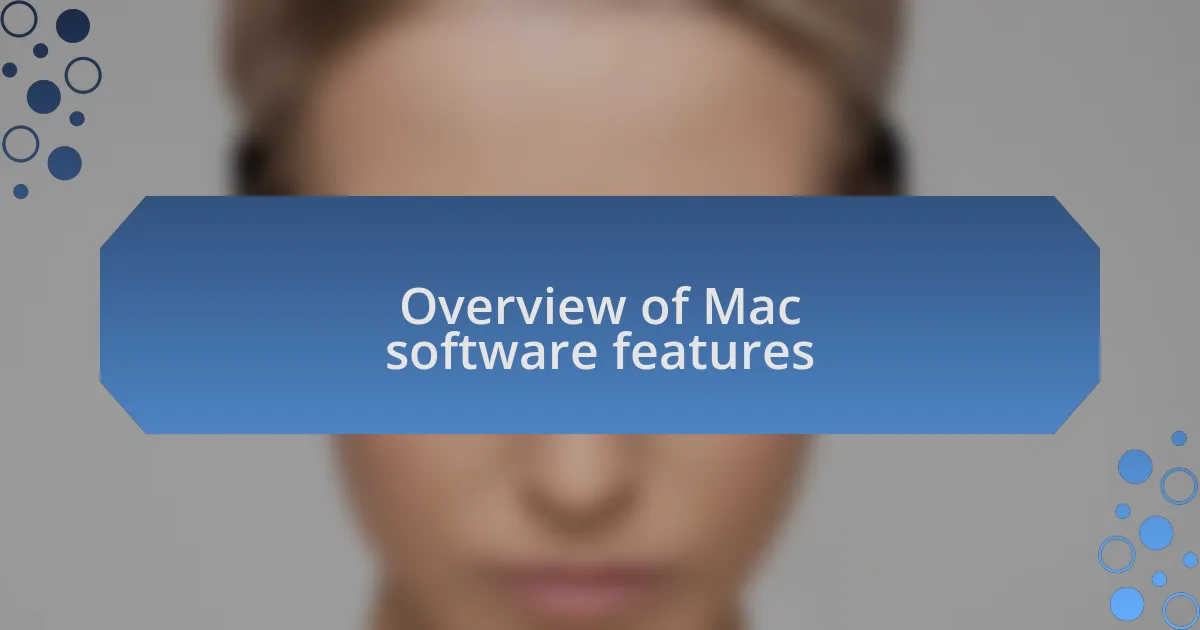
Overview of Mac software features
Mac software is renowned for its user-friendly interface and seamless integration across the Apple ecosystem. I recall the first time I experienced the fluidity of switching between macOS and iOS devices; it felt like everything was in harmony. Applications like Handoff allow you to start a task on one device and finish it on another, which truly enhances productivity.
Another remarkable feature is the robust security architecture that macOS offers. I still remember the peace of mind I felt when I learned about Gatekeeper, which blocks unverified apps from running on my system. This emphasis on security made me appreciate the significance of safeguarding personal information in today’s digital landscape.
Additionally, the suite of built-in applications, like Pages and Keynote, showcases Apple’s commitment to providing tools that enhance creativity and efficiency. When I created my first presentation in Keynote, I was captivated by its intuitive design options that allowed my ideas to shine. How often do we find ourselves working on projects that could benefit from having engaging and visually appealing tools at our disposal? For me, these features transformed mundane tasks into opportunities for creative expression.
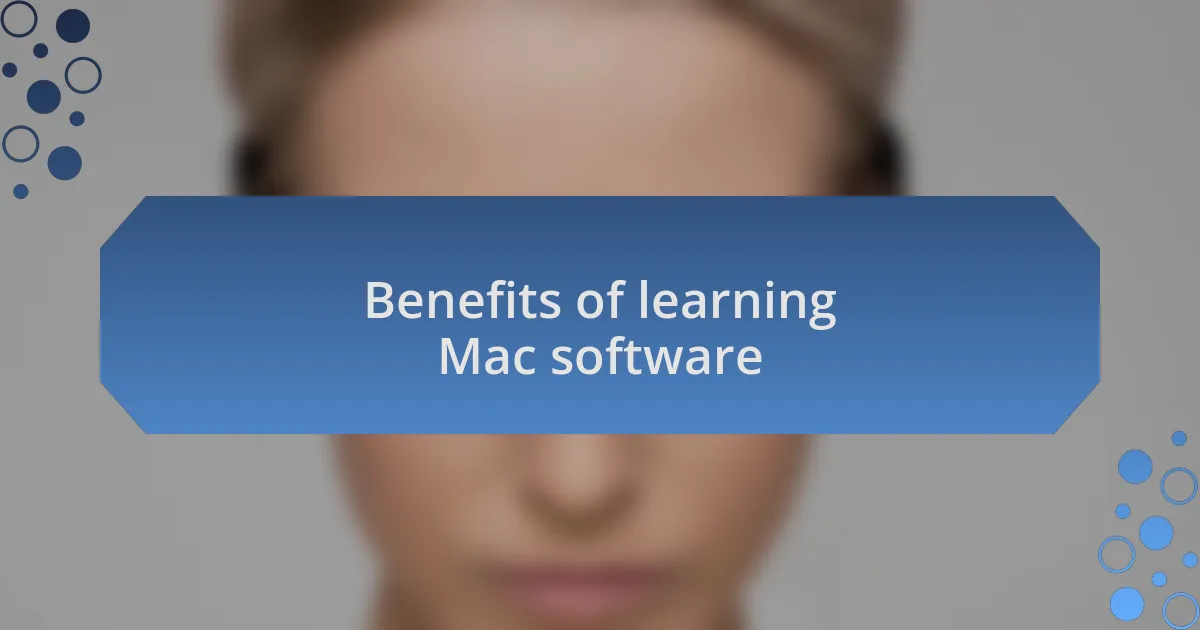
Benefits of learning Mac software
Learning Mac software opens up a world of creativity and collaboration. I remember the thrill of using Final Cut Pro for video editing; the learning curve was steep, but the culmination of my efforts in crafting a short film felt incredibly rewarding. How can software transform a simple idea into something visually compelling? It’s this transformative power that drives so many of us to dive into the Mac ecosystem.
Engaging with Mac software also means stepping into a community of like-minded individuals. I often find myself in discussions with fellow users, sharing tips and tricks that enhance our workflows. Doesn’t it feel great to tackle challenges together? The support and collaboration fostered within the Apple community make learning not just a personal journey but a shared experience, enriching our understanding and skills.
Moreover, mastering Mac software can significantly boost your professional prospects. I can’t help but recall how my proficiency in Logic Pro helped me land a gig producing music for local bands. It’s amazing how specialized knowledge in this software can open doors to exciting opportunities. What could you achieve with just a little practice and dedication in mastering these tools? The potential is limitless.
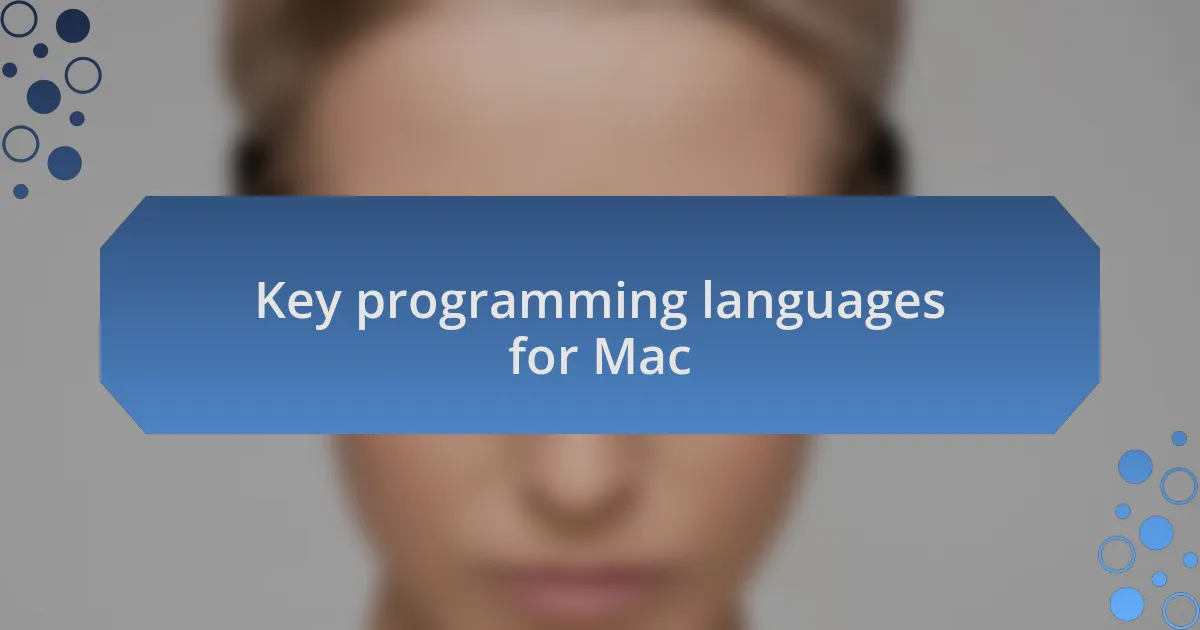
Key programming languages for Mac
When it comes to programming for Mac, Swift stands out as a key language. I remember the moment I first dabbled in Swift; it felt like piecing together a puzzle where each piece clicked seamlessly into place. The language’s clean syntax is not only user-friendly but resonates well with those who appreciate the elegance of Apple’s design philosophy. Don’t you find it fascinating how a well-designed language can enhance your coding experience?
Another essential language for Mac development is Objective-C. I recall attending a workshop where we explored its legacy and significance in creating some iconic Mac applications. Understanding Objective-C feels like unlocking a door to many existing applications that still rely on it. Why do so many developers continue to use it? Well, its deep integration with Apple’s frameworks makes it a fundamental part of the ecosystem.
Lastly, don’t overlook Python, especially if you’re interested in automating tasks or data analysis on your Mac. I’ve used Python in various projects, and I can genuinely say that its versatility is a game changer. It allows me to create scripts that save time and improve efficiency, which is invaluable in today’s fast-paced environment. Has leveraging Python ever transformed the way you approach your projects? It certainly did for me, opening up a whole new realm of possibilities.
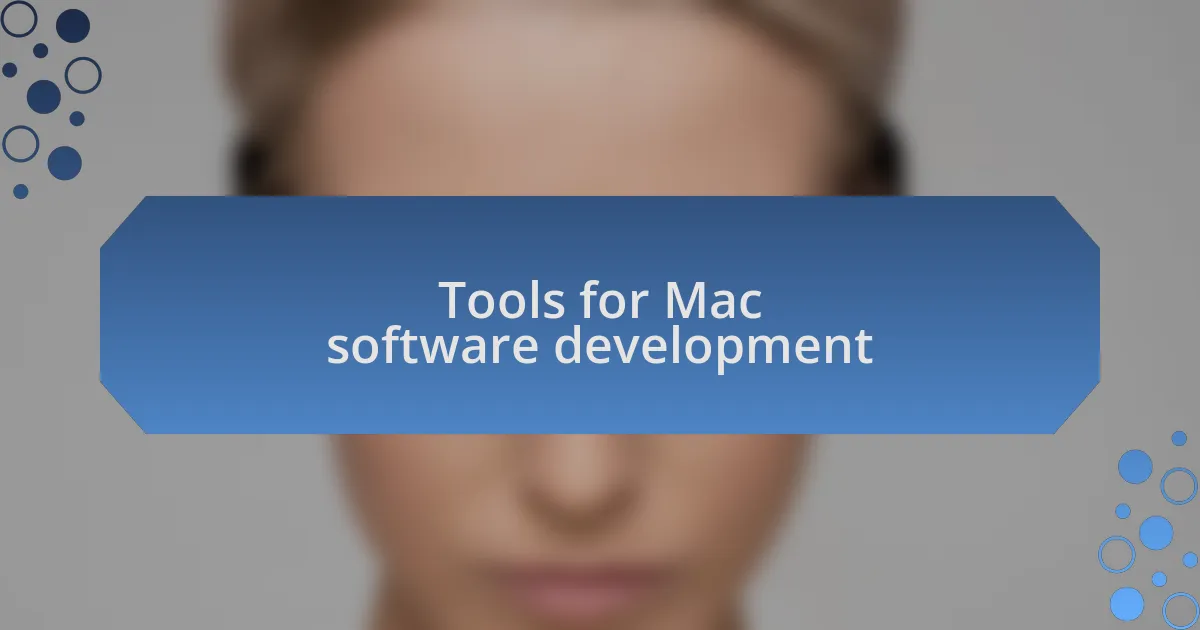
Tools for Mac software development
When it comes to tools for Mac software development, Xcode is at the forefront. I still remember my initial experience setting it up—my heart raced with anticipation as I dove into the world of app development. Xcode isn’t just an integrated development environment (IDE); it’s like having a digital crafting space where every tool you need is right at your fingertips. Isn’t it comforting to have a comprehensive environment to streamline your development process?
Another invaluable tool is Homebrew, a package manager that simplifies the installation of software. The first time I used Homebrew, it felt like I had stumbled upon a treasure chest of resources. It saved me countless hours that would have been spent navigating through installation hurdles. Have you ever found a tool that just makes life easier? For me, Homebrew did just that, making it a must-have for anyone serious about Mac development.
Lastly, I can’t emphasize enough the utility of Git and GitHub for version control. I recall a project where I made a significant coding mistake, and it left me feeling anxious about losing precious work. However, with Git, I was able to roll back to a previous version quickly, easing my fears. Isn’t it reassuring to have a safety net like that? Embracing these tools not only enhances productivity but also instills a greater sense of security in our coding endeavors.
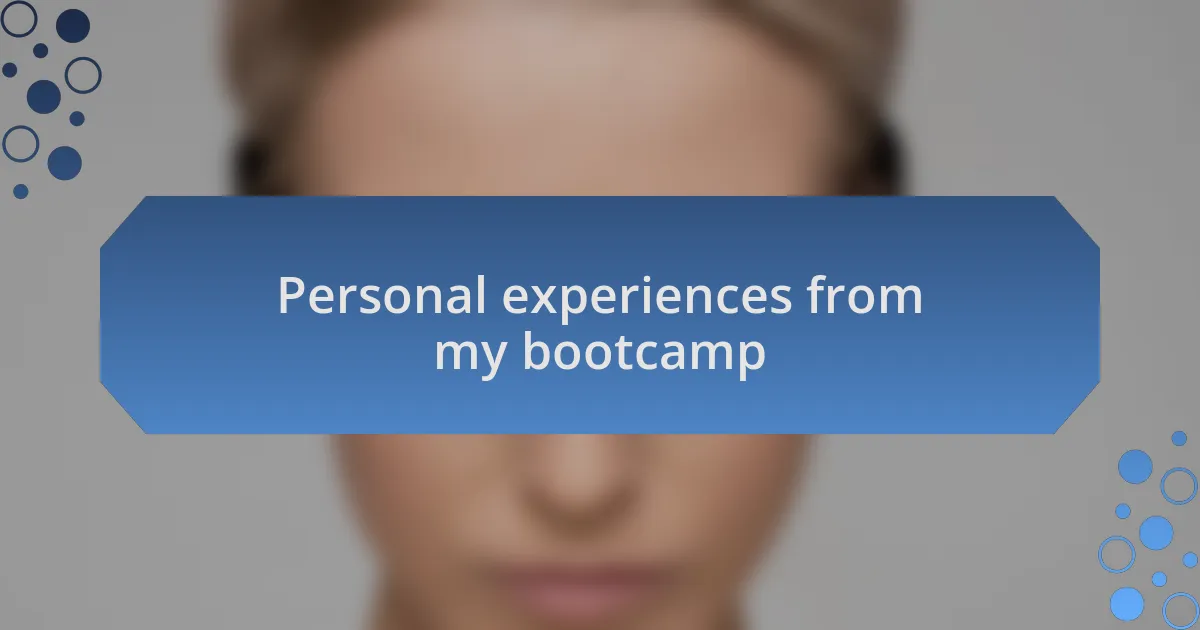
Personal experiences from my bootcamp
I remember walking into my programming bootcamp feeling excited yet overwhelmed. The first day was a whirlwind of coding logic and syntax, and it didn’t take long for the realization to hit me—programming isn’t just about writing code; it’s about problem-solving. Have you ever faced a challenge that seemed insurmountable? I certainly did, especially when I had to debug an error in my first project. The thrill of finally solving that issue was a huge boost to my confidence.
One memorable experience from my bootcamp was working collaboratively with my peers on a group project. Initially, I was apprehensive about sharing my ideas, fearing they wouldn’t be good enough. But as we began brainstorming, I discovered the power of teamwork. Sharing thoughts and receiving constructive feedback not only improved my coding skills but also built my belief in my abilities. How often do we underestimate the value of support from others?
There was a moment during a late-night coding session that still makes me smile. After hours of trying to get my code to work, I finally hit ‘run,’ and the project launched successfully! That rush of joy was unforgettable. It reinforced the idea that perseverance is key in programming. Have you ever experienced a breakthrough that made all the struggles worthwhile? For me, that moment showed me that persistence can lead to remarkable outcomes.
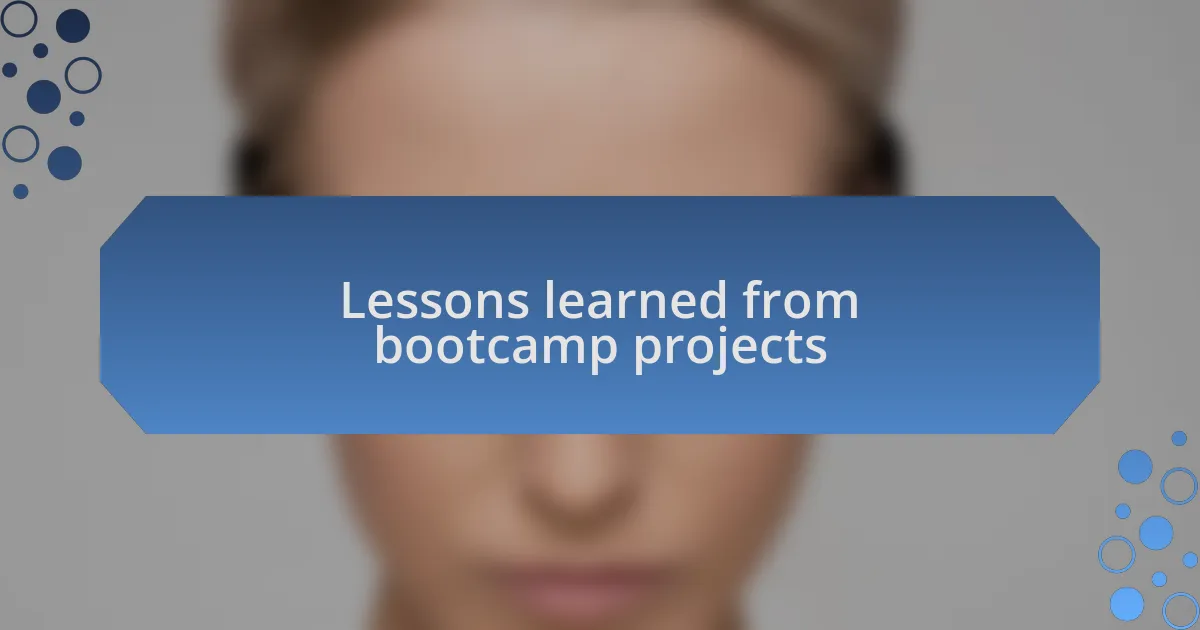
Lessons learned from bootcamp projects
Working on projects during bootcamp taught me the importance of iteration. I vividly remember my first attempt at a web application; it was clunky and far from perfect. However, through the process of refining my design based on user feedback, I learned that improvement is a continuous journey. Have you ever looked back at an early creation and felt a mix of pride and embarrassment? That evolution is essential.
Another lesson I took to heart was the significance of time management. On one occasion, I found myself buried in deadlines while juggling multiple projects. I had to learn quickly how to prioritize tasks effectively. This experience not only honed my coding skills but also instilled a critical life lesson: knowing how to allocate your time wisely can dramatically influence your success. Do you often find yourself overwhelmed by competing priorities?
Collaboration emerged as a crucial theme throughout my bootcamp projects. I remember engaging with a teammate who had a different approach to coding than mine. At first, our disagreements felt challenging, but I soon realized they pushed me to rethink my strategies and broaden my understanding. This revelation left me pondering: isn’t it remarkable how different perspectives can enrich our work? Embracing diverse viewpoints transformed our project from ordinary to extraordinary and underscored the value of teamwork.